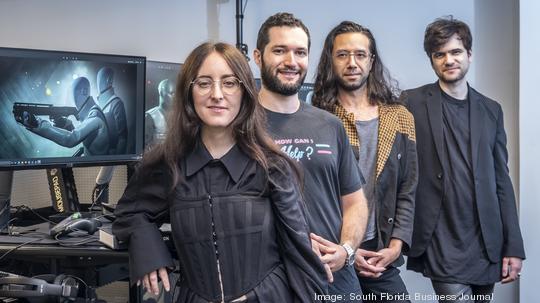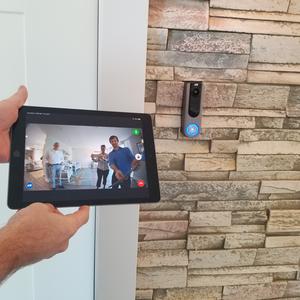Caribu co-founder Max Tuchman knew she had to get creative when she began raising seed funding for the Miami startup.
That was especially clear after a meeting with a venture capital firm in 2019. The firm was interested in investing, but asked for too much equity in exchange for that capital, she said. Tuchman wanted to get her interactive video platform for children off the ground, but she knew she couldn’t accept the offer.
“The deal was unfair, but that happens to founders, especially women and people of color, more than you think,” Tuchman said. “They know you’re in a bind. Where else are you going to get the capital?”
That experience eventually led Caribu to equity crowdfunding. The startup ultimately raised $1.7 million through the process, which allows small-scale investors to put money into an early-stage business for a portion of its ownership.
The practice is gaining more converts after the U.S. Securities and Exchange Commission changed the rules this year to let businesses raise up to $5 million every 12 months, a nearly fivefold increase from the previous $1.07 million limit.
The higher threshold gives businesses the ability to obtain more capital than ever through equity crowdfunding, creating opportunities for ventures that struggle to obtain funding from institutional investors.
Through crowdfunding, regular people can get a slice of the business, a boon for those who want to participate in the early stages of a private company. It’s a potentially powerful fundraising option for South Florida founders, who historically struggle to raise venture capital at the same pace as their peers in places such as Silicon Valley and Austin, Texas.
Freedom from institutional capital
Venture capital was the first place Aexlab co-founder and CEO Jonathan Ovadia turned when he needed to raise funds for the virtual reality gaming startup.
Ovadia and his co-founders – Chief Technology Officer Albert Ovadia, also his brother, and Chief Creative Officer Elizabeth Ann Clark – bootstrapped the concept until late 2020. At that point, they needed more capital than their own to move the concept forward. Ovadia sat down at his computer and made a list of every venture capital firm he could find that invested in virtual reality startups.
Then, he started pitching.
“I figured I’d get a lot of noes, but all it takes is one yes,” he said. “So, I kept trying.”
He was shot down by every firm he contacted, if they responded at all. The ones who did said Aexlab needed more users before they would contribute. Others insisted he move the concept away from Miami to win VC backing.
After nearly a year of rejections, Ovadia wondered if there was a future for Aexlab. But its fortunes changed in early 2021, after it secured more than $1 million in an equity crowdfunding raise on StartEngine. Aexlab raised the funds from more than 1,000 investors – most of them passionate gamers – who in return received nonvoting shares of the startup.
“VCs would definitely want more control, so this ended up being a better deal for us,” he said.
Businesses are not required to change management or give up a board seat after an equity crowdfunding campaign, both common scenarios after a venture capital raise. VC money still dominates the startup funding space, but crowdfunding is anticipated to take on a larger role with the new $5 million cap, which supporters say makes crowdfunding a legitimate option for businesses that need more than $1 million a year to cover their expenses.

Uplifted by community
For Tuchman, one of the biggest advantages of equity crowdfunding is that it allows founders to build a community of support from investors who truly believe in her and her product.
As a female founder, Tuchman said she often felt she had to work twice as hard to convince venture capitalists that her concept had an audience and was worth backing. Instead of citing her education experience in meetings – Tuchman was formerly the executive director of Teach for America Miami-Dade – she found herself leading with her Harvard Business School credentials to demonstrate she was an entrepreneur to be taken seriously.
“Some people will find any reason to question a woman founder,” she said. “For example, I had one male investor say to my face that he can’t invest in [companies led by] mothers because they can’t invest 100% of their time to the business.”
Companies with all-female founding teams received just 2.4% of the capital raised by U.S. startups in 2020, down from 3.4% the year before, according to Crunchbase, a platform that tracks tech investments. Startups with female founders raised $3.2 billion last year, $1 billion less than in 2019.
Advocates hope crowdfunding can reverse that trend by directing more resources to startups that historically struggle to obtain institutional funding, such as women- and minority-led ventures.
Ovadia said his company gained something almost as important as capital from the crowdfunding raise: a community of VR gamers. Allowing gamers to invest and have a piece of Aexlab makes them even more committed to its success.
“They spend so much time testing the game, giving us notes,” he said of Vail VR, a first-person shooter game Aexlab is developing. “You can’t pay for that kind of honest feedback.”
One of the strengths of an equity crowdfunding campaign is that it enables startups to pitch hundreds or thousands of potential investors at once. And all of them could be future customers.
Still, just because a venture has the option to raise $5 million a year doesn’t mean the endeavor will be easy. Crowdfunding can require a huge amount of time and effort to be successful, especially for founders who do not have a strong social media presence or a formidable network of followers to pitch.
The numbers prove it can be challenge: Although 1,035 new companies raised almost $215 million through equity crowdfunding in 2020 – up 105% from the year before – only 48 of those ventures raised $1 million or more, according to data from Crowdwise, a crowdfunding resource.
Some founders know that crowdfunding is an option, but they’re still not biting.
Derrick Miles, founder of CourMed, a concierge health care services startup, said he raised funds from investors such as Microsoft when he launched the Texas-based company. He said CourMed, now in the process of establishing a regional hub in Miami, has benefited from its connections with established corporations and experienced investors. That’s a perk that may not come with an independent crowdfunding campaign, he added.
“[Crowdfunding] is just not for me,” Miles said.
Venture capital firms can also connect startup founders with skilled investors who also serve as mentors. That guidance can be key for new entrepreneurs trying to build a successful company.
Stepping stone to VC funding
If a startup can raise the funds, the higher equity crowdfunding limit can offer enough capital to get the venture off the ground without having to cede control to institutional investors.
But strong crowdfunding campaigns can also pique the interest of venture capitalists and other mainstream investors that may have previously deemed the venture a risk, especially for startups that manage to hit the $5 million cap.
That’s an advantage for founders who may need more capital than equity crowdfunding can offer at their next growth stage, said Krishan Arora, founder of the Arora Project, a crowdfunding media agency.
The Miami-based organization has helped raise more than $100 million for high-growth ventures by creating digital marketing campaigns designed to amplify the reach of a crowdfunding effort.
“$5 million is like a Series A round,” Arora said. “It’s enough for investors to take [a startup] seriously.”
That was true for Aexlab.
“It’s very funny how life works,” Ovadia said. “No one wanted to give us money, and then we raised money and Miami tech got big. Now we keep getting calls.”
For now, Aexlab is avoiding venture capital. Ovadia and his co-founders are reluctant to relinquish control of the company they’re still building. Ideally, Aexlab will launch another equity crowdfunding raise when it needs additional capital.
“I personally don’t see the need for another kind of investment unless we get to the point where we need something huge,” he said.
What is equity crowdfunding?
Legalized under Title III of the Jumpstart Our Business Startups Act (JOBS) in 2016, equity crowdfunding allows businesses to raise capital from a crowd of small-scale investors through the sales of securities (usually equity) in their company. The process enables anyone – not just accredited investors – to put money into a venture in exchange for ownership, regardless of their income or net worth, opening up early-stage startup investing to the masses. The SEC currently allows businesses to collect up to $5 million through crowdfunding every 12 months.
Top crowdfunding platforms
There are several crowdfunding sites available for U.S.-based startups and equity investors, including:
- AngelList
- MicroVentures
- WeFunder
- StartEngine
- SeedInvest
For more stories like this one, sign up for Miami Inno newsletters from the South Florida Business Journal and the American Inno network.








